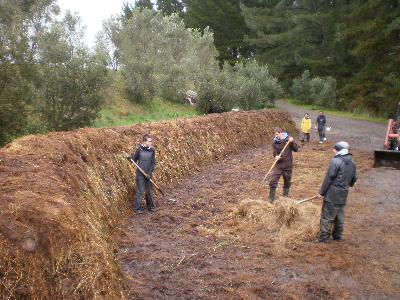
A resilient and evolving sustainable farming system strives to reduce the amount of brought-in farm inputs, such as fertilizer.
At Seresin Estate we have developed a considered composting system that utilizes many aspects of our land, and we strive to gather as much as possible from our whole landscape. The result is that we have coppiced willow woodlots to provide valuable renewable carbon, we harvest hay from the vineyard headlands, mulch feral woody plants from our native plantings such as broom and gorse, as well as other creek-line grasses that are not sprayed out. A small herd of cows provides valuable dung. The winery wastes of grape marc and lees also form key components.
The mix we choose to use comprises approximately 30% winery waste, 30% hay, 30% woodchips and 10% fresh cut creek-line grasses – it also includes the biodynamic compost preparations. All in all we make about 300 tonnes of biologically diverse compost.
We choose to apply the majority of this compost as a tea, using a “Cyclone Multi-tasker” sourced from Chaos Springs. The addition of minerals, such as lime or rock phosphate is also simple, effective and dust-free using this method. We make additions of our own home-made locally-sourced seaweed teas, home-made worm teas and composts, plus a special brew of cow manure compost.
This has been a process that we have worked at over many years and continue to work with. The vines are proving to be highly resilient to many insect pests and fungal disease.
Sustainability at work.




